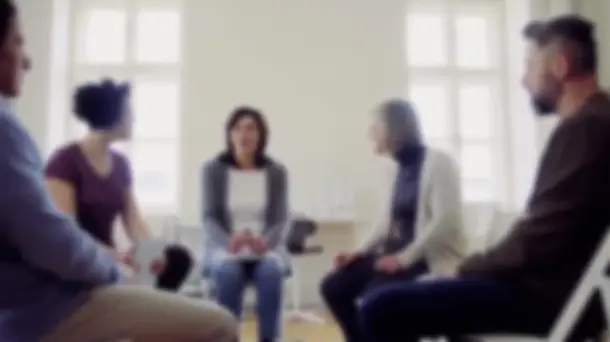Welcome to Narcotics Anonymous
What is our message? The message is that an addict, any addict, can stop using drugs, lose the desire to use, and find a new way to live. Our message is hope and the promise of freedom.

“When new members come to meetings, our sole interest is in their desire for freedom from active addiction and how we can be of help.”
It Works: How and Why, “Third Tradition”
Is NA for me?
This is a question every potential member must answer for themselves. Here are some recommended resources that may be helpful:
Need help for family or a friend?
NA meetings are run by and for addicts. If you're looking for help for a loved one, you can contact Narcotics Anonymous near you.
Subscribe to NAWS Emails
Sign up to receive Just for Today and SPAD daily meditation emails, as well as NAWS News, NAWS Updates, and more.
Never before have so many clean addicts, of their own choice and in free society, been able to meet where they please, to maintain their recovery in complete creative freedom.
Basic Text, “We Do Recover”
Recovery Quicklinks:
Service Quicklinks:
Narcotics Anonymous sprang from the Alcoholics Anonymous Program of the late 1940s, with meetings first emerging in the Los Angeles area of California, USA, in the early Fifties. The NA program started as a small US movement that has grown into one of the world's oldest and largest organizations of its type.
Today, Narcotics Anonymous is well established throughout much of the Americas, Western Europe, Australia, and New Zealand. Newly formed groups and NA communities are now scattered throughout the Indian subcontinent, Africa, East Asia, the Middle East, and Eastern Europe. Narcotics Anonymous books and information pamphlets are currently available in 49 languages.
Information About NA
Daily Meditations
Just for Today
March 05, 2026 |
From rude awakening to spiritual awakening |
| Page 67 |
| “When a need arises for us to admit our powerlessness, we may first look for ways to exert power against it. After exhausting these ways, we begin sharing with others and find hope.“ |
| Basic Text, p. 82 |
| We've sometimes heard it said in our meetings that “rude awakenings lead to spiritual awakenings.” What kind of rude awakenings do we have in recovery? Such an awakening might occur when some undesirable bit of our behavior that we thought safely hidden away is suddenly revealed for all the world to see. Or our sponsor might provoke such an awakening by informing us that, just like everyone else, we have to work the steps if we expect to stay clean and recover. Most of us hate to have our covers pulled; we don't like being laid naked in full view. The experience delivers a strong dose of humility. Our first reaction to such a disclosure is usually shock and anger, yet we recognize the truth when we hear it. What we are having is a rude awakening. Such awakenings often disclose barriers that block us from making spiritual progress in our recovery. Once those barriers are exposed, we can work the steps to begin removing them from our lives. We can begin experiencing the healing and serenity which are the preludes to a renewed awakening of the spirit. |
| Just for Today: I will recognize the rude awakenings I have as opportunities to grow toward spiritual awakening. |
A Spiritual Principle a Day
March 05, 2026 |
Free to Simply Be |
| Page 67 |
| “Letting go of the idea that we have to understand why things happen or how it all works frees us to have a spiritual experience without wondering if we're doing it right.“ |
| Living Clean, Chapter 2, “Connection to a Higher Power” |
| Addicts are perceptive people, or so we like to think. When we were using, we could go somewhere we'd never been and easily find either a way to get drugs or someone to use with. Our intuitions and insights often serve us well in recovery, especially as the Steps help us to improve our ability to discern between the voice of self-will and that of conscience. Learning the difference can be a challenge since the disease talks to us in our own voice. Freedom from our disease depends on it. With practice and the help of other recovering addicts, we improve our connection to our intuition and our conscience. We gain the freedom to make better choices, and our lives improve. Trusting in the process–and in our conscience–can be scary. How can putting down the drugs make the obsession go away? How can we be sure our sponsor won't share our inventory with everyone? What happens if we let go of that defect that has been protecting us? We just don't like not knowing. Step Two in our Basic Text tells us, “We can use this Power long before we understand it.” One member shared, “I've been staying clean on a Higher Power that I don't understand for over 25 years, and I'm starting to get okay with never knowing. It still works!” No matter how perceptive we are, our perception is limited. There are wavelengths of light not visible to the human eye, pitches of sound not perceptible to the human ear. We cannot know the totality of things. When we get okay with not knowing, we can shift our focus to what we do feel, sense, and perceive in the present. We are free to be right here, right now. |
| ——— ——— ——— ——— ——— |
| It's okay if I don't know. I will enjoy the freedom to just be. |
Do you need help with a drug problem?
“If you’re new to NA or planning to go to a Narcotics Anonymous meeting for the first time, it might be nice to know a little bit about what happens in our meetings. The information here is meant to give you an understanding of what we do when we come together to share recovery…”
Subscribe to NAWS Emails
Sign up to receive NAWS Updates and NAWS News emails as well as Just for Today and SPAD daily emails.



